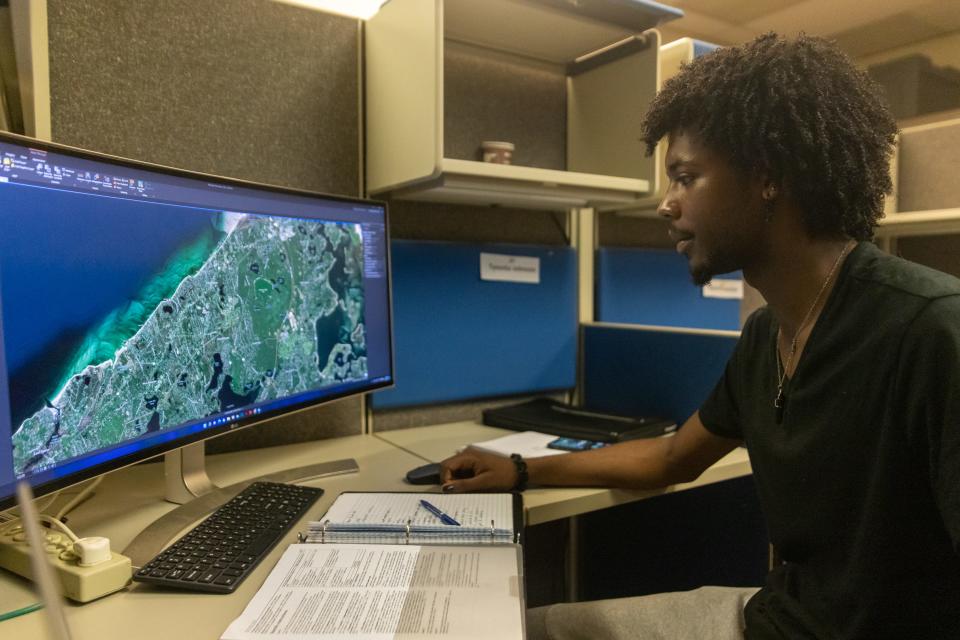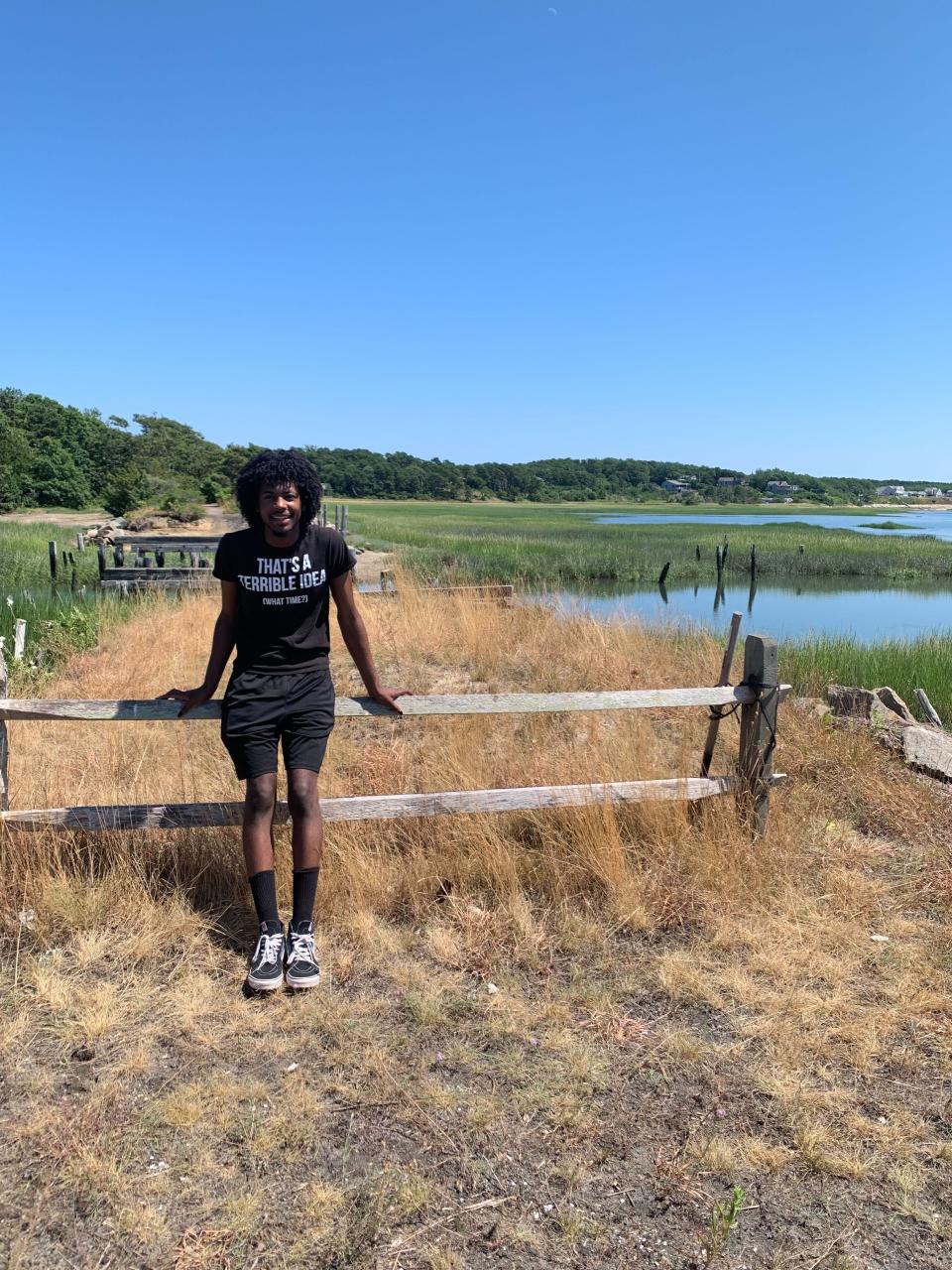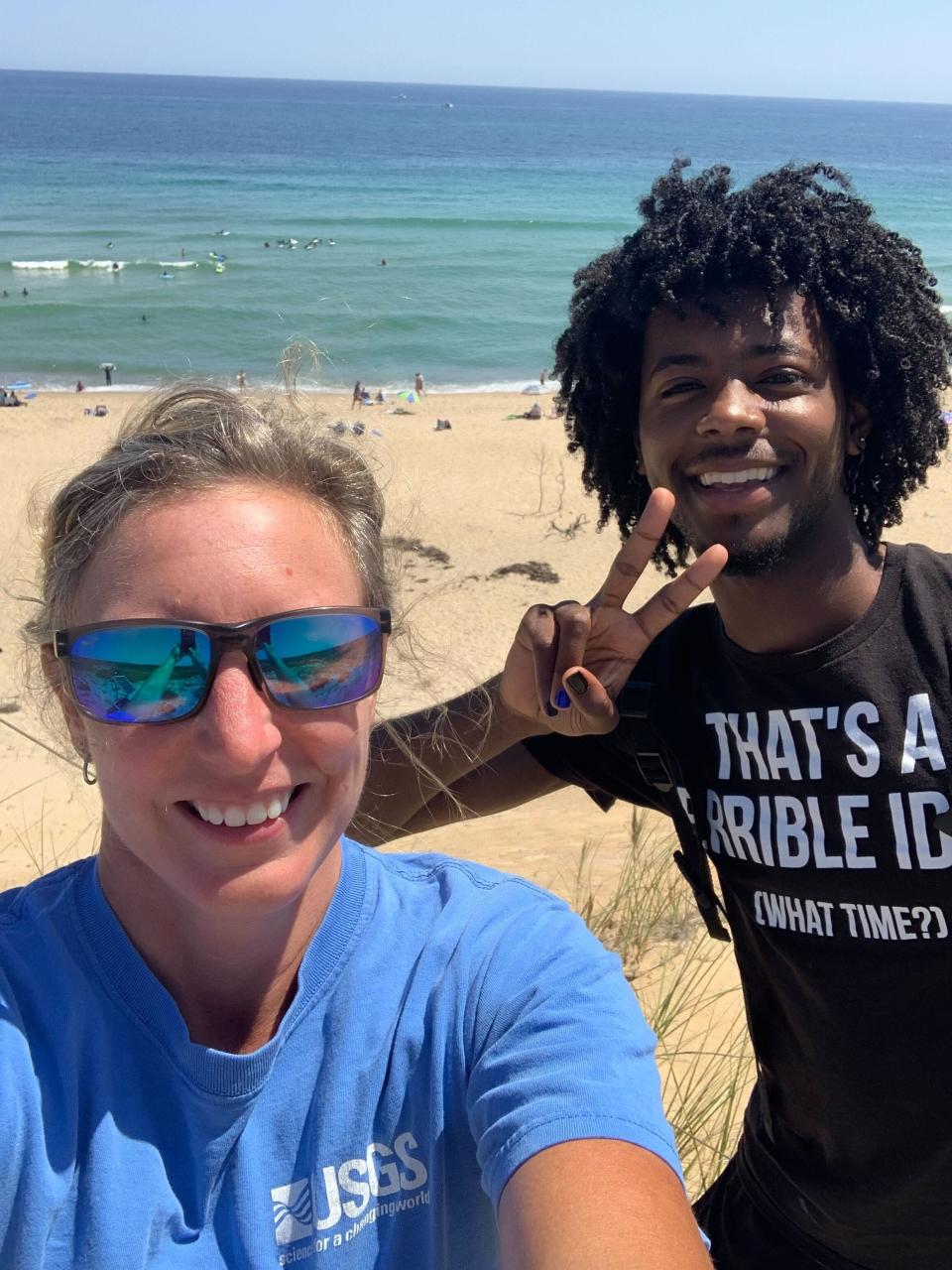Facing adversity, science-minded college students bring diversity to Woods Hole
WOODS HOLE — While Woods Hole, a village in the southwest tip of Falmouth, is known worldwide as a hub of ocean research, exploration, and education, it's lacking in aspects of racial diversity, said Onjalé Scott Price.
"Woods Hole is a predominantly white, predominantly male-dominated community in the sciences," Scott Price, co-director of the Woods Hole Partnership Education Program, said. "We want to give students, who may not traditionally come to Woods Hole, an opportunity to come here and do research."
Falmouth, which has a year-round population of 33,000, is 92.3% white alone, in the census category of race and Hispanic origin.

Which is why the Partnership Education Program, known as PEP, was launched in 2009, through the Woods Hole Diversity Initiative and the Woods Hole Diversity Advisory Committee. The program is sponsored by Woods Hole scientific institutions, participating college and universities and a handful of other partners.
Student participants have experienced uncomfortable situations in the community, though, such as feeling isolated, stared at and discriminated against, and have learned about how alienation can help strengthen resolve.
"I’m from Baltimore – it’s very Black, heavy. When I came here it’s culture shock," Tyvonta "Ty" Johnson, 22, who is Black, said. "I try to be cool with everybody, but so many people stared at me and gave off this awkward, weird feeling."
Diversity forms foundation of PEP
PEP is a 10-week program designed primarily for college juniors and seniors from underrepresented groups in marine and ocean sciences and includes a four-week course in global climate change and a research project.
More: Equity advocates at the Juneteenth Freedom Walk in Falmouth call for continued reform
In June, 17 students came from all over the country to Woods Hole to participate, and conduct research with scientists. It's the first summer since the COVID-19 pandemic began that students participated in person, Scott Price said.
Scott Price said she has not yet compiled statistics about the diversity of the students who have gone through the program.
Beyond extending research opportunities, the goal of the program is to also change the way people within the area think about diversity, and the way scientists and educators recruit for other programs, Scott Price said.
Only 18% of doctorates are awarded by U.S. institutions to scientists who identify as a racial or ethnic minority, according to the National Science Foundation. The ultimate goal of PEP is to see the workforce of every industry be representative of the diversity of the population of the U.S, said Scott Price.
"There’s proof that says the more diverse a group is — whether that’s science, business, or marketing — the better the results are," she said. "If you have different viewpoints, you can reach different people."
The original PEP program also led to the evolution of a second program that gives PEP alumni a chance to return to Woods Hole after they graduate from college.
Baltimore student excels in PEP
When Johnson applied to PEP, he was excited to conduct research at the United States Geological Survey-Woods Hole, along with some of the most revered scientists in the world, he said.
The program's focus on diversity was also a draw for the Morgan State University student.
More: Assault charges end in diversion program for Sandwich student Ras Russell
Johnson was paired with Elizabeth Pendleton, a geologist at USGS, as his mentor.
While Johnson is a biology major, the duo began a project focused on climate change, using a tool called Coastal Change Likelihood. By using geographic information system mapping, Johnson learned how to analyze land coverage, and track changes over time based on hazards like tidal flooding, erosion and sea level rise.

Because he is a biology major, the concepts were initially far removed from Johnson’s comfort zone. But learning that climate change and biology share certain concepts mattered.
“Learning about climate change is good because when I go to grad school, I want to focus on habitat work and environmental conservation,” Johnson said.
More: Mud to table: Wellfleet oyster farms grow shellfish for your plate. Here’s how.
Pendleton, Johnson said, also made an effort to incorporate biological components of learning into his research and sent him into the field to research piping plovers. Throughout the summer, part of Johnson’s project focused on the birds and their nesting sites, which partially helped Johnson indicate what areas of the Cape would most likely change in the future.
More: How hiring a school superintendent landed in small claims court, and drew claims of bullying
Following data collection for the project, Johnson went to Provincetown and other outermost Cape Cod areas to visit piping plover nesting sites and take photographs for his end-of-summer internship presentation.
Each PEP student receives a $5,000 stipend along with travel expenses, housing, meals, field trip admissions, trolley passes and more. Each student only needs to provide spending money for items like souvenirs.
A feeling of alienation for PEP students, such as a bus ride
While he's enjoyed his time with Pendleton, Johnson said he felt out of place in Woods Hole. When he tried to engage in conversations with Woods Hole community members or sit down in areas around the village, people would jerk away from him, he said, or move their children when they saw him coming.
Students in the program were also having a hard time with transportation, said Johnson.
At the beginning of the summer, the Cape Cod Regional Transit Authority created free passes for PEP students to ride the $2 Whoosh Trolley.
For the first month of his internship, Johnson said he avoided the trolley because other students in the program said the drivers wouldn’t stop for them or gave them a hard time when they did try to board.
More: Kindness Week at Bourne Intermediate School
But on July 12, Johnson was too far from his lab to walk, and he boarded a transit authority bus by mistake — a vehicle that didn’t accept the student passes. Instead of correcting Johnson, the driver told Johnson he needed to either pay $2 or leave the bus.

Confused, Johnson said he tried to explain he was a PEP student.
The driver took Johnson's card out of his hand and said he was going to call someone to handle the situation.
"I’m thinking in my head, 'who are you even calling?'" said Johnson. "'Are you calling the police?'"
Eventually, another rider paid for Johnson's ticket and he was allowed to board the bus.
While Johnson said the driver could have "been having a bad day," he felt the trouble stemmed from the color of his skin.
More: Revealing 99% of the ocean floor: WHOI's submersible Alvin reaches new depths
"I've dealt with micro-aggressions. I get that all the time. But this was intense. I was humiliated and embarrassed," he said. "He didn't want to deal with me at all. We all rode in silence after that. It was awkward and uncomfortable for everyone."
More: Opinion: Falmouth must use parking lot lease as bargaining chip with SSA
After Johnson told Scott Price about his experience, she called Kathy Jensen, the deputy administrator and mobility manager of the transit authority, to inquire about the issue.
Jensen, in a phone interview with the Times, said she looked at the video surveillance on the day of the incident.
"The driver could have handled it a little bit better, a little gentler," Jensen said. "But it didn't seem like he was malicious in any way."
Scott Price said she knows Johnson wasn’t blowing the incident out of proportion.
More: Falmouth man arrested for allegedly sending bomb threat to Arizona election official
“People will say, ‘well it wasn’t that bad,’ or ‘they took that the wrong way,’” she said. “But, it’s like, no, my experiences as a person of color in this white space can be harmful. This is frustrating. And I know this happened to me. Don’t try to tell me that it didn’t.”
Preparing summer students to live in predominantly white area
At the beginning of each summer program, Scott Price said she talks with PEP students, and their mentors, about what it’s like for people of color in predominantly white areas. Mentors also go through training to understand how to support students if they are racially targeted.
“We talk to students about potential scenarios they could find themselves in and we tell them to be mindful about the spaces they’re in,” she said. “For the mentors, we emphasize being culturally competent and teach them the best ways to react to these situations.”
After the incident in July with the bus driver, Johnson went back to the lab and told Pendleton what happened.
More: Fresh Pond town well in Falmouth reopened as part of Air Force base cleanup dating from 1970s
They took the opportunity to have a "hard conversation," Pendleton said, about some "harsh realities," regarding the Cape community.
"It's so unrelatable as a white woman to me, so all I could really do was listen and that doesn’t feel adequate," she said.
Discomfort fosters sense of self, says Kim Porras
Kim Porras, 18, another PEP student, has been working with the Buzzards Bay Coalition analyzing water quality data. Porras, who is originally from Nicaragua, will head to the University of California Santa Cruz in the fall. She has spent much of her life in the Bay Area in California.
Initially, Porras said, it was hard to adjust to the lack of diversity in race and ethnicity in Woods Hole.
"I tried not to be bothered by it but it did feel weird at first," she said. "Where I come from in California, you see Asian people, Hispanic, Black, white — almost in the same neighborhoods — all living together."
At the beginning of the summer, Scott Price had told the PEP students there was a high chance they would experience discrimination, Porras said.
More: Falmouth Demonstration against overturn of Roe v. Wade
"Being uncomfortable helped me make my presence known and to trust myself. Have confidence in myself," she said. "I tell myself that I belong here — just like anyone else belongs here."
Surrounded by different perspectives is healthy, says one student
Haley Roche, 18, another PEP student, is from Rhode Island and attends St. Mary’s College in Maryland, and studies biology. This summer she conducted human oral microbiome research alongside Scott Chimileski, a research scientist at the Marine Biological Laboratory; and co-mentor Jessica Mark Welch, an associate scientist at the same lab.
More: Pickleball fatigue: Fun for players, stressful for neighbors
Since the beginning of the summer, the trio analyzed many of the roughly 500 different species of bacteria that can be found in the human mouth. Often, Roche can be found sitting at the laser scanning confocal microscope, helping her mentors recreate bacterial communities to study them better.
Throughout the programming, Roche said she was inspired by the research and said it will help her excel as she embarks on a scientific career.
As one of two white students in the PEP program, Roche said she has learned about what the other students are facing.
"Even if an experience that you are hearing doesn’t make sense to you — it doesn’t mean it’s not happening," Roche said. "Being here has shown me that I always want to surround myself with different people so I can always have an open perspective."
This article originally appeared on Cape Cod Times: Diversity initiative brings college students to study at Woods Hole

